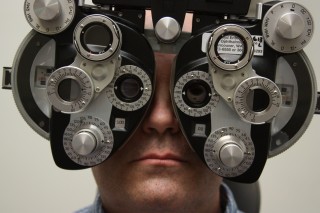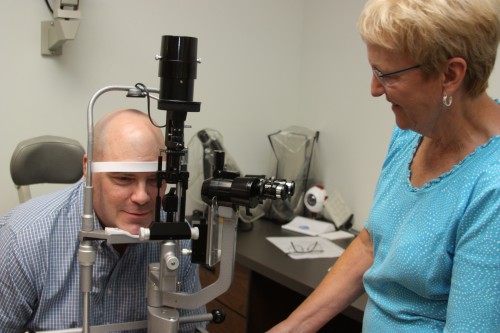This content was published: September 30, 2013. Phone numbers, email addresses, and other information may have changed.
Simple eye test key in preserving Graham Bartley’s vision and his life
Photos and story by James Hill
Graham Bartley’s chance path to the Ophthalmic Medical Technology Program may have saved his life.
“I feel blessed,” Bartley said. “If you think about all the happenstances that had to occur to get me to this point; it’s incredible. The odds of me ending up in that test was infinitesimal.”
An eye exam, which first-year OMT students perform on each other as part of their training, caught serious vision loss in his left eye in 2012. The test consisted of clicking a button in his hand when he saw a little white dot at various places in his peripheral vision. For Bartley, who was paired with a fellow student for the test, the clicks really slowed down as the dots focused on the left eye.
“It was a ‘click’ and then some times several seconds went by and another ‘click,’” he said. “That was not good. I knew I had a big problem. I knew I had substantial visual field loss in my left eye. It was then like, ‘Well now, we really have a problem here.’”
OMT faculty immediately leaped into action to get the care Bartley needed. The program’s director, Joanne Harris, said there were no formal protocols in place in the event something like this happened, but steps were quickly taken to figure out what was wrong.
“Your brain just says, ‘Okay, well, that’s not a very clear image, let’s use this eye,’” Harris said of how Bartley didn’t detect the vision loss. “Unless you consciously cover one eye it’s hard to notice things like that. It’s gradual. The instructor went in and she ran the test again and got the same result. So we got Dr. Davis involved.”
On staff in the OMT department as an instructor is retired ophthalmologist David Davis. It was 45 minutes after Bartley took Davis’ midterm that the instructor put him through more vision tests at his Vancouver, Wash., eye clinic. Fearing a detached retina, which would have meant permanent vision loss, Davis got him in to see a retina specialist a few hours later. He then referred Bartley to a neuro-ophthalmolgist who determined that the eye had suffered from a lack of blood flow. The likely cause of the visual field loss was a tumor pushing on the optic nerve.
As it turned out, Bartley had a benign tumor between the brain and the skull. If untreated, the tumor would have caused blindness in the left eye as well as the right eye. Ultimately, It would have killed him.
“I had no inkling,” said Bartley, 52. “It was a blessing that it was caught at the time that it was.”

As a second-year student, Bartley earned a $750 Ophthalmic Medical Technology Scholarship through the PCC Foundation and plans to graduate in the spring of 2014.
During the next year, he endured 14 MRIs, seven CAT scans and two surgeries (one four- and the other nine-hours long) that included a craniotomy so surgeons could get access to remove the tumor. It was a dangerous procedure because of the delicate muscles, and important nerves and veins that, if harmed, would have “blinded me, killed me, paralyzed part of my face, and all kinds of nasty stuff.”
Then it was on to five-days-a-week radiation therapy to stop the progression of what was left of the tumor. Doctors told him he had virtually no chance to get the lost vision back and the goal was to make sure his vision didn’t get worse. But after three weeks, Bartley regained 30 percent of the vision. His oncologist told him that the remaining remnant of the tumor would not affect his lifespan.
“Today, I’ve regained approximately 65 to 70 percent of my vision,” Bartley said with a smile. “It continues to improve as the swelling goes down. They don’t know how much more the vision will improve, but I’m ecstatic obviously.”
Bartley can’t believe the sequence of events that led him to taking that test in the OMT lab. The only reason he came to PCC is due to a career change and he needed to retrain. He took a career exploration test that suggested he should pursue a job in the medical field. Then, he searched for types of programs that could fit with what he was interested in, which turned out to be the eyes and Ophthalmic Medical Technology.
Located at the PCC Cascade Campus, the OMT program is the only associate’s degree program of its kind in the western United States. The program, established in 1992, boasts a 95 percent placement rate for students within three months of graduation. In the fall two years ago, Bartley entered the program as one of 21 students in his class.
Today, Bartley reports the return of his short-term memory – a victim of the radiation treatments and from the surgeries. Now he can study, and comprehend at a level consistent with his pre-operative status. As a second-year student, Bartley earned a $750 Ophthalmic Medical Technology Scholarship through the PCC Foundation and plans to graduate in the spring of 2014. It will cap an amazing and difficult two years, but he says the experience has made him a better person.
“The little stuff isn’t that big of a deal anymore,” Bartley said. “I’m much more patient and more compassionate. I’ve always had empathy for patients, but people have helped me and I look forward to doing that for others.”



What an amazing story! Great work from Opthalmic Tech students!
Wow, this is a moving story! I am very impressed with the team work of the OMT members.
What an incredible story. Certainly peeked my interest in the Ophthalmic industry. I might just have to look into what I can do to possibly make this happen for someone else. Who said miracles aren’t real?
This is a great story and a testament to both Graham’s courage and PCC staff’s actions on behalf of their students. Makes me proud to be part of PCC!
Amazing story – Glad everyone was vigilant and the students, faculty and specialists caught the abnormality/tumor! So glad for Graham Bartley. I hope he can continue in his chosen field. Great article, James!
Great story! Really exemplifies PCC’s excellent staff and PCC’s approach to serving our students. Good luck Graham!
Great Story! Good Luck Graham.
I had a similar situation (10 years ago) when I went to an ophthalmologist for the first time. After dilating my eyes, the ophthalmologist could see pressure on my optic nerve.
My brain tumor was a craniopharyngioma. Since then, I have met 5 other individuals from my high school (Westview) that also had brain tumors. I never realized how common they are.
Graham, I wish you the best of luck for your recovery and healing!
This is my second time reading your vision on your life, and I applaud you for being brave.For myself I came face-to-face with a wrong eye surgery on the 1st of October and am thankful I can see, im not blind.Congradulations and keep smiling.
How amazing! I am so excited for you that you were able to be treated and your vision is improving. I have had countless visual fields. I went in for a regular eye exam when I was pregnant with my daughter a few years ago and the ophthalmologist found my optic nerves were severely swollen. My life changed in an instant with a diagnosis of pseudotumor cerebri. In my opinion, it is even worse than a tumor because it is a “fake” tumor and a very serious disorder that will make you go blind. I too have lost peripheral vision but have had 5 brain surgeries and am now better than ever. I still have the disease but I am enrolled in school and plan on graduating in 2015. I love the doors that PCC has opened to me. A few years ago, I almost didn’t make it after all the surgeries with the depression that followed but I overcame it and am working towards a lifetime dream. Your story is an inspiration to me!! Good luck and I hope you continue to get better :-)